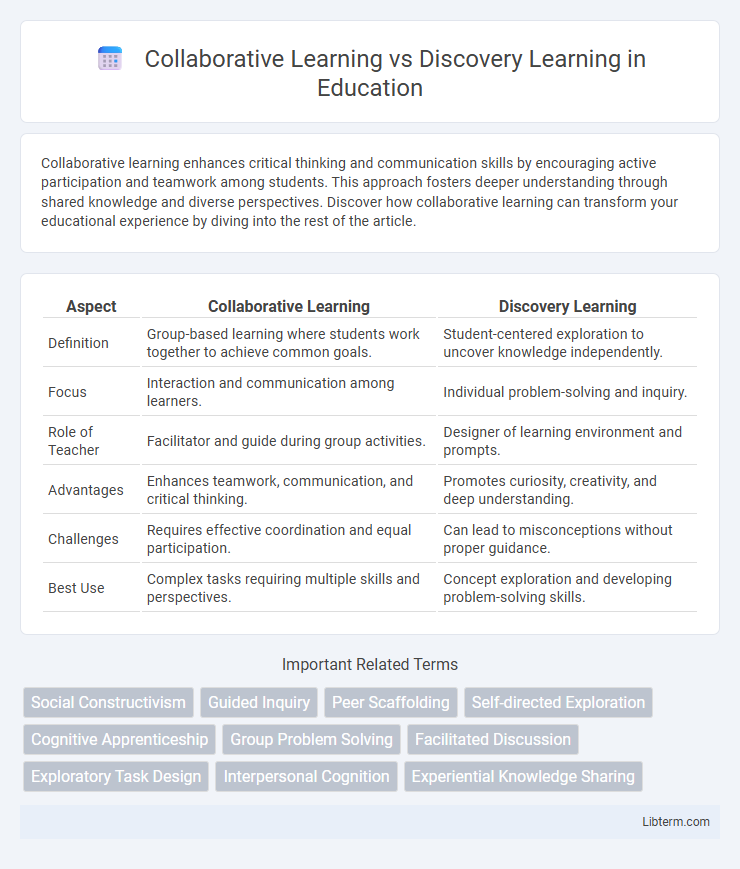Collaborative learning enhances critical thinking and communication skills by encouraging active participation and teamwork among students. This approach fosters deeper understanding through shared knowledge and diverse perspectives. Discover how collaborative learning can transform your educational experience by diving into the rest of the article.
Table of Comparison
| Aspect | Collaborative Learning | Discovery Learning |
|---|---|---|
| Definition | Group-based learning where students work together to achieve common goals. | Student-centered exploration to uncover knowledge independently. |
| Focus | Interaction and communication among learners. | Individual problem-solving and inquiry. |
| Role of Teacher | Facilitator and guide during group activities. | Designer of learning environment and prompts. |
| Advantages | Enhances teamwork, communication, and critical thinking. | Promotes curiosity, creativity, and deep understanding. |
| Challenges | Requires effective coordination and equal participation. | Can lead to misconceptions without proper guidance. |
| Best Use | Complex tasks requiring multiple skills and perspectives. | Concept exploration and developing problem-solving skills. |
Introduction to Collaborative and Discovery Learning
Collaborative learning emphasizes group interaction where learners work together to solve problems, share knowledge, and build understanding collectively, enhancing communication and teamwork skills. Discovery learning encourages learners to explore, experiment, and uncover concepts independently, fostering critical thinking and deeper comprehension through active engagement with the material. Both approaches aim to promote active learning but differ in social interaction and the role of guidance during the learning process.
Defining Collaborative Learning
Collaborative learning involves students working together in small groups to achieve a shared academic goal, emphasizing interaction, communication, and mutual support. This method fosters critical thinking and enhances social skills by encouraging learners to discuss, debate, and construct knowledge collectively. Unlike discovery learning, which centers on individual exploration, collaborative learning prioritizes group dynamics and cooperative problem-solving.
Defining Discovery Learning
Discovery learning is an instructional approach where learners actively explore and experiment to construct knowledge independently, emphasizing problem-solving and critical thinking skills. Collaborative learning involves students working together in groups to achieve shared learning goals through discussion, cooperation, and mutual support. While collaborative learning fosters social interaction and collective knowledge building, discovery learning prioritizes individual inquiry and self-guided discovery of concepts.
Key Principles of Collaborative Learning
Collaborative learning centers on shared goals, interdependence, and social interaction, where students actively engage in group discussions, problem-solving, and peer feedback to enhance understanding. It emphasizes positive interdependence, individual accountability, face-to-face promotive interaction, and development of interpersonal skills. This approach contrasts with discovery learning, which relies more on individual exploration and self-guided inquiry without structured group collaboration.
Core Elements of Discovery Learning
Discovery learning centers on active exploration where learners construct knowledge through interaction with materials and problems, promoting intrinsic motivation and deeper understanding. Core elements include learner autonomy, problem-solving tasks, and inquiry-based activities that stimulate critical thinking and creativity. Unlike collaborative learning, which emphasizes group interaction and peer feedback, discovery learning focuses on individual cognitive engagement and self-directed discovery.
Advantages of Collaborative Learning
Collaborative learning enhances critical thinking and problem-solving skills by encouraging students to engage in group discussions and diverse perspectives. It fosters communication, teamwork, and social interaction, which are vital for real-world applications and professional environments. Research shows that collaborative learning improves retention and academic achievement compared to individual or discovery learning methods.
Benefits of Discovery Learning
Discovery learning promotes deeper understanding by encouraging students to actively explore concepts and solve problems independently. It enhances critical thinking skills and fosters creativity through experiential engagement with material. This approach supports long-term retention by allowing learners to construct knowledge based on personal insights and experimentation.
Challenges and Limitations of Each Approach
Collaborative learning often faces challenges such as unequal participation among group members and difficulties in managing diverse opinions, which can hinder effective knowledge construction and lead to social loafing. Discovery learning, while promoting active engagement, may result in cognitive overload and frustration due to insufficient guidance, making it less effective for learners lacking prior knowledge or problem-solving skills. Both approaches require careful scaffolding and facilitation to address these limitations and maximize educational outcomes.
Comparing Outcomes: Collaborative vs Discovery Learning
Collaborative learning enhances critical thinking and interpersonal skills by promoting group interaction, while discovery learning fosters individual problem-solving abilities and intrinsic motivation through self-guided exploration. Research indicates collaborative learning improves retention and understanding by integrating diverse perspectives, whereas discovery learning encourages creativity but may result in varied outcomes based on learners' prior knowledge. Both approaches contribute uniquely to cognitive development, with collaborative learning excelling in social skill acquisition and discovery learning emphasizing autonomous knowledge construction.
Choosing the Right Approach for Your Classroom
Choosing the right approach between collaborative learning and discovery learning depends on your classroom goals, student needs, and subject matter. Collaborative learning enhances social skills and teamwork by engaging students in group tasks, making it ideal for subjects requiring communication and collective problem-solving. Discovery learning promotes critical thinking and self-guided exploration, fitting well with inquiry-based curricula where independent reasoning and experimentation are essential.
Collaborative Learning Infographic

 libterm.com
libterm.com